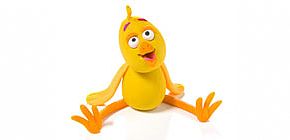Child's Play: On the Importance of Play and the Role it Plays in Infant Development
.jpg) |
|
While still in the womb, the infant’s senses began to work: they heard their mother’s voice and her heartbeat, they moved their hands and legs, changed positions and reacted to various foods their mother ate. And from the moment they entered the world, their senses grew sharper and they experienced a new reality, in which mom has a scent that could be sensed, and in which there are other people, like dad, grandpa and siblings. They experienced new scents and sounds, the feeling of clothing on their body and learned to get to know new states, like hunger and tiredness. Our role as parents is to help our infants cope with this powerful experience and regulate the outside world so that it suits them, such as dimming the lights, swaddling in soft cloths and more. After the first month, infants already know and feel comfortable in their new world and are ready to play.
Games for 1-3 month olds
At this age, infants experience the world via hearing, short-range sight and touch. Give them time to respond to every stimuli and do not despair if there is no reaction at all. Towards three months of age, they will already be extending their hands towards objects, smiling at you and responding to play.
Hi, here’s Mr. Bear: Since infants cannot yet see from far, offer objects and toys with varying textures from up close and encourage them to reach out and touch them.
Born to dance: At this age, it is recommended to forego your state-of-the-art surround sound system - your voice is what your infant likes listening to best. Sing to your infant and dance with them in your arms. Sing songs you love - the more you enjoy, the more your infant will as well. Don’t worry about looking silly - that’s what curtains were invented for! While dancing you should alternate positions, shifting your infant from shoulder to shoulder, to a cradle position, onto their belly, facing outwards and more. Every position change will require your infant to work their muscles and gain strength.
Games for 3-6 month olds
At this age, the tactile sense comes into play. Infants are willing and interested participants in your games. Try playing games that encourage them to move in space, reach out, lift their heads while laying on their bellies, straighten up and advance.
Wow, magic!: This is the age when infants are transfixed by how objects move, like a spray bottle, box with a lid, bubbles and objects of various textures, like paper, wool, dough and others. As long as the objects aren’t dangerous or poisonous, let them touch them and try and understand how you created such a surprisingly wonderful item. No need for a big production. All you need is to open a closet or drawer, et voila!
Here it comes: At this age, infants have learned the sense of expectation, so you can sing a song that amplifies in volume as it progresses, play “airplane” with any object that approaches, or any other idea.
Games for 6-9 month olds
At this age, infants know how to transfer items from hand to hand. Using play, you can help them improve this skill and work towards crawling and sitting upright.
Rock band: Offer your infant a set of pots and a wooden spoon, while you rick a broom/electric guitar - you’re a rock band! Playing together is much more fun than playing alone. If your infant is not yet sitting, you can seat them in your lap. Their drive to hold the spoons will encourage them to balance.
Flying ball: Lightly tap a rubber ball while you both lay on your bellies. This will encourage your little one to inch forward and crawl.
Cause & effect: At this age, infants can already link cause and effect, so you can encourage them to turn on a light switch, press the red button on the TV remote or the cold water tab on the water cooler and see what happens.
Mimicry: Infants love to copy. You can make sounds (Doggie woof woof), faces (Oy, sour) and sing songs with hand motions, like “Head and shoulders,” “The wheels on the bus,” “This little piggy,” “Where is thumbkin” and others.
Any woman who has nursed or who is currently nursing knows just how well breastfeeding helps form a bond between mother and child and creates ...
One of the more important elements to keeping your infant healthy is ensuring they receive a regular supply of iron. An iron deficiency can lead to a ...
The first three years of your infant’s life are the MOST significant with respect to development. During these years, infants acquire new skills in ...


.jpg)
.jpg)
.jpg)
.jpg)



.jpg)
.jpg)
.jpg)
.jpg)

.jpg)


.jpg)
.jpg)
.jpg)
Contact us